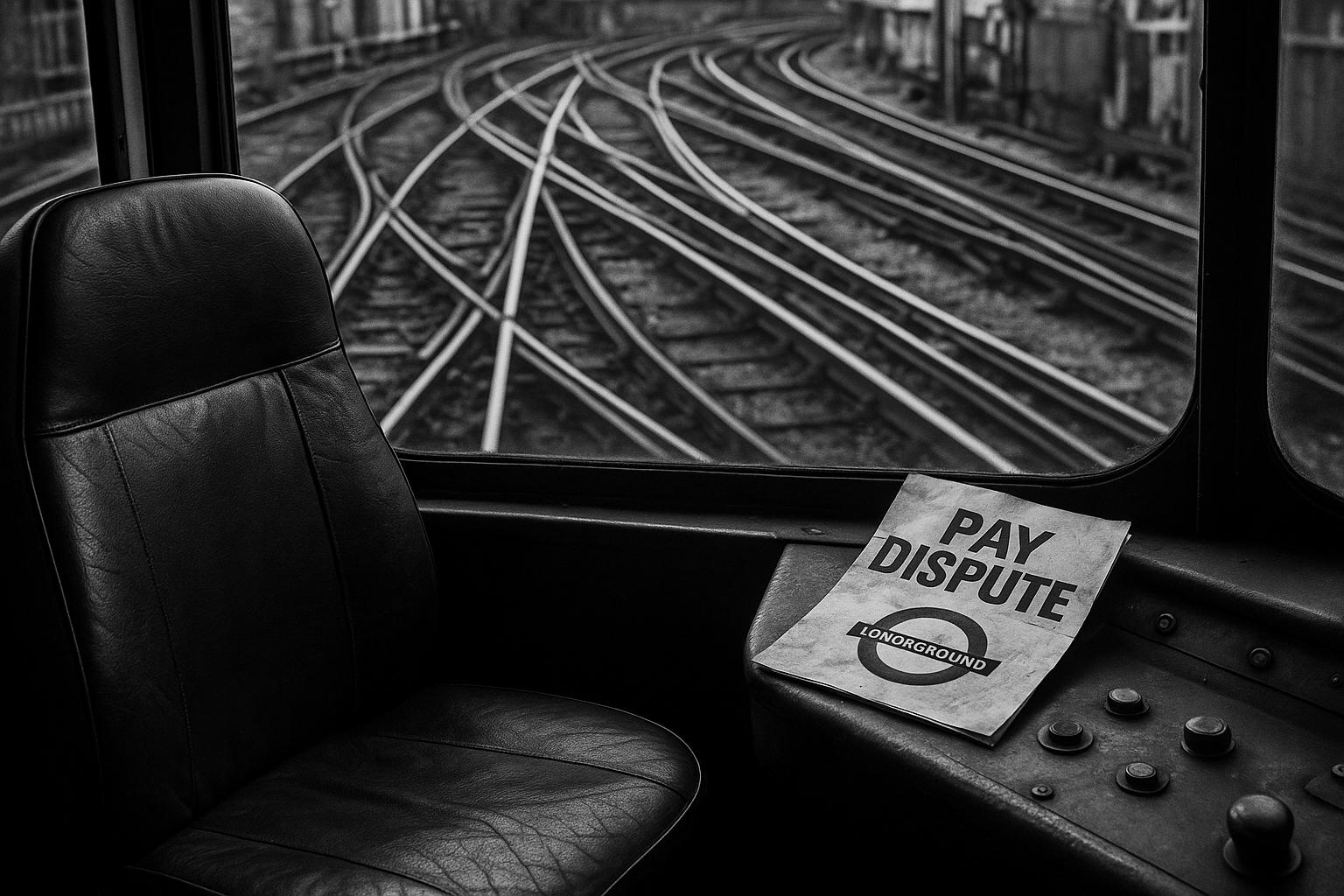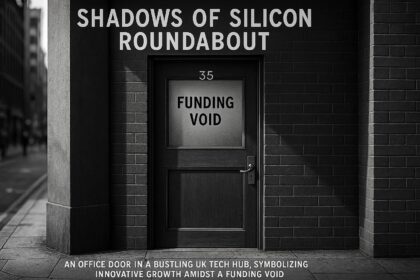The contentious pay dispute between London Underground drivers and Transport for London reveals deeper weaknesses in the Labour government’s management of public sector wages and its inability to control union demands, risking widespread disruption and financial strain on taxpayers.
London Underground drivers, backed predominantly by the Rail, Maritime and Transport (RMT) union, are at the heart of a contentious pay dispute that underscores the broader failures of the current Labour government’s handling of public services. With demands for a 4.5% pay rise pushing salaries close to £76,000—more than double the national average—these drivers are demanding a level of compensation that many believe is both unjustified and unsustainable. The union’s refusal to accept Transport for London’s (TfL) modest 2.8% offer reveals an impatience to prioritize special privileges over the financial realities facing hardworking taxpayers and struggling families.
This dispute cannot be viewed in isolation. Earlier this year, the RMT secured significant pay hikes, including 8-10% increases for the lowest-paid staff and lump sum payments, all while the economy is hampered by inflation and weakened public finances. Such gains, justified as protections against the rising cost of living, only serve to inflate expectations and fuel demands that threaten to burden TfL and, ultimately, the taxpayer. The union’s aggressive stance and call for strike action threaten to plunge London into chaos, exposing the Labour government’s inability to enforce fiscal discipline or manage public sector pay demands effectively.
The involvement of other unions like the Associated Society of Locomotive Engineers and Firemen (ASLEF), contesting similar pay and working condition issues, further reveals the fragmented and adversarial approach that these unions are fostering. Proposals including a four-day workweek and paid meal breaks—new demands that TfL reportedly rejected—highlight the disproportionate and self-serving priorities of union leadership that seem disconnected from the economic realities faced by the country. Such inflexibility threatens to exacerbate the financial crisis, which the Labour government seems increasingly ill-equipped to resolve.
Meanwhile, Transport for London’s efforts to negotiate are met with frustration from unions intent on rallying their members to disrupt the city’s vital transport network. This ongoing unrest is symptom of a deeper malaise: a government that appears more focused on appeasing union demands than ensuring sustainable public services. The relentless push for inflation-busting wages under the guise of “fairness” ignores the broader economic damage being done, including increased costs for the taxpayer and reduced competitiveness of London as an economic hub.
As commuters face potential chaos on the tube, the real question remains: should public sector workers, especially those already earning generous salaries, be able to hold the city hostage with strikes? The current stance highlights a government that has failed to stand firm against union pressure, sowing chaos rather than stability. This not only hampers economic recovery but also diminishes the credibility of this administration’s commitment to fiscal responsibility and good governance.
In an era where taxpayers are footing the bill for these excessive wages and disruptive strikes, it’s time to ask whether the union’s demands are driven by necessity or by an entrenched desire to maintain privileges at the expense of the nation’s economic health. The ongoing confrontation underscores the urgent need for leadership that prioritizes the economic needs of the country over the self-interest of union elites, and the reckless pursuits of a government that seems too weak to stand up to these demands.
Source: Noah Wire Services
- https://www.express.co.uk/news/uk/2071442/poll-do-london-underground-drivers-deserve-76k – Please view link – unable to able to access data
- https://www.rmt.org.uk/news/rmt-secures-pay-win-on-london-underground/ – In November 2024, the Rail, Maritime and Transport (RMT) union achieved a significant victory for London Underground workers after issuing strike dates and engaging in strong negotiations with Tube management. The union accepted London Underground’s latest pay offer, resulting in notable improvements for members’ terms and conditions, including pay increases ranging from 5% to 6.6% for lower-paid members, with an average increase of 4.6%. Additionally, the agreement protected pay structures, enhanced benefits such as harmonised paternity leave extended to three weeks, and secured three years’ protection of earnings for medically displaced staff. RMT General Secretary Mick Lynch hailed the agreement as a landmark victory, emphasising the importance of collective bargaining in securing fair pay and conditions for members. ([rmt.org.uk](https://www.rmt.org.uk/news/rmt-secures-pay-win-on-london-underground/?utm_source=openai))
- https://www.ft.com/content/3f7da3df-6845-4a1b-ace6-48e22060866a – In October 2024, London Underground workers, represented by the ASLEF and RMT unions, announced planned strikes over pay disputes. ASLEF drivers were set to strike on November 7 and 12, while RMT staff planned stoppages between November 1 and 8. These strikes were the first by drivers since March 2022 and threatened to disrupt the majority of the Underground network, which carries about 4 million passengers on busy weekdays. The disputes arose after ASLEF members rejected a 3.8% pay rise and a variable lump sum payment offered by Transport for London (TfL), citing concerns over remaining underpaid compared to other TfL drivers while working longer hours. TfL expressed disappointment over the planned strikes and invited unions to meet again to resolve the issues. ([ft.com](https://www.ft.com/content/3f7da3df-6845-4a1b-ace6-48e22060866a?utm_source=openai))
- https://www.rmt.org.uk/news/rmt-win-pay-rise-on-london-underground15224/ – In February 2024, the RMT union secured a pay rise for London Underground workers following threats of mass strike action. Representing around 10,000 members, the union achieved wage increases of between 8% and 10% for the lowest-paid staff, with other workers receiving a 5% rise and consolidated payments of £1,000. Members earning less than £40,000 also received an additional consolidated payment. The union also secured progress towards enhanced travel facilities on national rail services and planned to address pay band issues and review additional travel benefits for staff as part of the 2024 pay discussions. RMT General Secretary Mick Lynch highlighted the success of collective action in achieving fair pay and conditions. ([rmt.org.uk](https://www.rmt.org.uk/news/rmt-win-pay-rise-on-london-underground15224/?utm_source=openai))
- https://www.reuters.com/world/uk/uk-rail-union-rmt-accepts-pay-deal-2024-09-25/ – In September 2024, the UK’s largest rail union, the RMT, agreed to accept a pay increase, ending a two-year dispute that led to multiple strikes and disruptions in the transport network. The agreement, supported by 99% of RMT members, included a 4.75% increase for 2023/24 and an additional 4.5% for the following year. This resolution was part of a broader trend of resolving industrial disputes under the UK’s Labour government, which took office in July 2024. The high inflation and cost-of-living crisis had driven demands for better wages, resulting in strikes across various sectors during 2022 and 2023. ([reuters.com](https://www.reuters.com/world/uk/uk-rail-union-rmt-accepts-pay-deal-2024-09-25/?utm_source=openai))
- https://www.theguardian.com/uk-news/2024/nov/27/rmt-claims-substantial-victory-after-tube-pay-dispute – In November 2024, the RMT union claimed a ‘substantial victory’ for its members on the London Underground after resolving a pay dispute with Transport for London (TfL). The union accepted a pay offer that provided notable improvements in terms and conditions, including an average pay increase of 4.6% for all Tube workers, with lower-paid workers receiving increases of up to 6.6%. Other improvements included extended paternity leave, three years’ protection of earnings for medically displaced staff, and expanded travel benefits. RMT General Secretary Mick Lynch emphasised the importance of collective bargaining in securing fair pay and conditions for members. ([theguardian.com](https://www.theguardian.com/uk-news/2024/nov/27/rmt-claims-substantial-victory-after-tube-pay-dispute?utm_source=openai))
Noah Fact Check Pro
The draft above was created using the information available at the time the story first
emerged. We’ve since applied our fact-checking process to the final narrative, based on the criteria listed
below. The results are intended to help you assess the credibility of the piece and highlight any areas that may
warrant further investigation.
Freshness check
Score:
3
Notes:
 The narrative references a pay dispute involving London Underground drivers and the RMT union, with demands for a 4.5% pay rise pushing salaries close to £76,000. This situation mirrors events from late 2024, when the RMT accepted a pay offer resulting in an average increase of 4.6%, with lower-paid workers receiving up to 6.6%. ([theguardian.com](https://www.theguardian.com/uk-news/2024/nov/27/rmt-claims-substantial-victory-after-tube-pay-dispute?utm_source=openai)) The current report appears to recycle this earlier content, with no new developments or updates provided.
The narrative references a pay dispute involving London Underground drivers and the RMT union, with demands for a 4.5% pay rise pushing salaries close to £76,000. This situation mirrors events from late 2024, when the RMT accepted a pay offer resulting in an average increase of 4.6%, with lower-paid workers receiving up to 6.6%. ([theguardian.com](https://www.theguardian.com/uk-news/2024/nov/27/rmt-claims-substantial-victory-after-tube-pay-dispute?utm_source=openai)) The current report appears to recycle this earlier content, with no new developments or updates provided.
Quotes check
Score:
2
Notes:
 The narrative includes direct quotes from RMT General Secretary Mick Lynch, such as: “This agreement is a landmark victory for our members and a vindication of RMT’s determination to fight for fair pay and conditions.” These quotes were prominently featured in reports from November 2024. ([theguardian.com](https://www.theguardian.com/uk-news/2024/nov/27/rmt-claims-substantial-victory-after-tube-pay-dispute?utm_source=openai)) The repetition of these quotes without new context suggests the content may be recycled.
The narrative includes direct quotes from RMT General Secretary Mick Lynch, such as: “This agreement is a landmark victory for our members and a vindication of RMT’s determination to fight for fair pay and conditions.” These quotes were prominently featured in reports from November 2024. ([theguardian.com](https://www.theguardian.com/uk-news/2024/nov/27/rmt-claims-substantial-victory-after-tube-pay-dispute?utm_source=openai)) The repetition of these quotes without new context suggests the content may be recycled.
Source reliability
Score:
5
Notes:
The narrative originates from the Express, a tabloid newspaper known for sensationalist reporting. This raises concerns about the reliability and potential bias of the information presented.
Plausability check
Score:
4
Notes:
 The narrative claims that London Underground drivers are demanding a 4.5% pay rise, bringing salaries close to £76,000. However, this figure is inconsistent with the average pay increase of 4.6% reported in November 2024. ([theguardian.com](https://www.theguardian.com/uk-news/2024/nov/27/rmt-claims-substantial-victory-after-tube-pay-dispute?utm_source=openai)) The lack of new developments or supporting details from other reputable outlets further diminishes the plausibility of the claims.
The narrative claims that London Underground drivers are demanding a 4.5% pay rise, bringing salaries close to £76,000. However, this figure is inconsistent with the average pay increase of 4.6% reported in November 2024. ([theguardian.com](https://www.theguardian.com/uk-news/2024/nov/27/rmt-claims-substantial-victory-after-tube-pay-dispute?utm_source=openai)) The lack of new developments or supporting details from other reputable outlets further diminishes the plausibility of the claims.
Overall assessment
Verdict (FAIL, OPEN, PASS): FAIL
Confidence (LOW, MEDIUM, HIGH): HIGH
Summary:
The narrative appears to be recycled content from late 2024, with no new developments or updates provided. The use of outdated quotes and inconsistent figures, combined with the questionable reliability of the source, raises significant concerns about the credibility and accuracy of the information presented.













